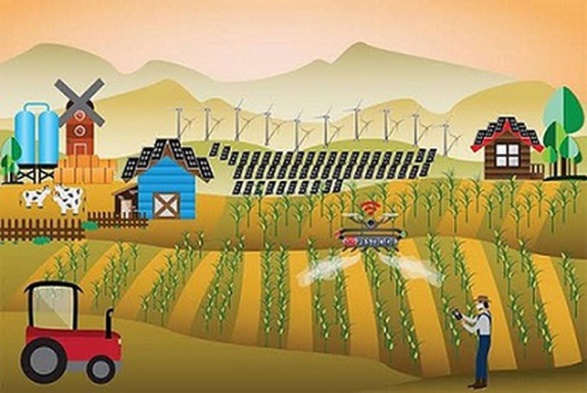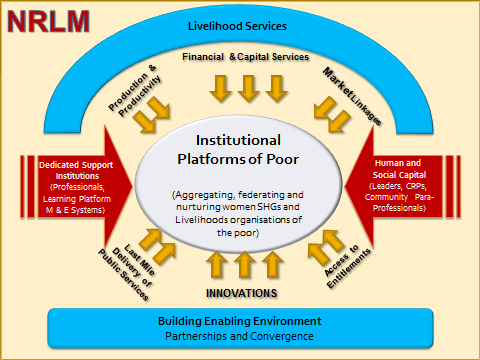Description

Disclaimer: Copyright infringement not intended.
Context:
- National Institute of Entrepreneurship and Small Business Development (NIESBUD) signed a Memorandum of Understanding (MoU) with the Ministry of Rural Development (MoRD) for implementing the Start-up Village Entrepreneurship Programme.
|
National Institute of Entrepreneurship and Small Business Development (NIESBUD) is an autonomous organisation under the Ministry of Skill Development.
|
SVEP:
- About: SVEP is a sub-component of Deendayal Antyodaya Yojana – National Rural Livelihoods Mission (DAY-NRLM) of the Ministry of Rural Development.
- Aim: It aims to support entrepreneurs in rural areas to set-up enterprises at the village-level in non-agricultural sectors. The scheme also aims at building an inclusive society by providing equal opportunities to all along with the required financial support.
- The programmatic intervention will address all three missing ecosystems – Knowledge, advisory and finance ecosystems.
Provisions under the recent partnership
- Under the partnership rural entrepreneurs will be able to access banking systems for receiving financial support for starting their enterprises, including support from MUDRA bank.
- Integrated ICT techniques and tools will also be provided for training and capacity building along with enterprise advisory services to augment the entrepreneurship ecosystem in India’s villages.
Beneficiaries:
- Any Rural poor who is willing to be entrepreneurial and self reliant is eligible to be part of this programme.
- Highly vulnerable beneficiaries under MGNREGA, marginalized sections, women, SC and ST communities and rural artisans will be given specific preference in selection, as part of this programme.
- The beneficiaries of the project are from the Self-Help Group (SHG) ecosystem of DAY-NRLM and the scheme not only supports existing enterprises but new enterprises as well.
Significance of SVEP:
- Rural entrepreneurship play a significant role in the overall economic development of India.
- SVEP will help create an innovative ecosystem, accelerating economic and social gains at the community level.
- The partnership will enable the rural community by helping them set up their trades and provide complete support till they are stabilized.
- This pragmatic intervention will provide knowledge, advisory and financial support to the public and will help create village-level community cadre.
- This partnership will help in training the rural community and will provide them with necessary resources for entrepreneurship to increase their income and will pave the way for building Aatmanirbhar Bharat.
As mentioned earlier, SVEP is a sub-component of Deendayal Antyodaya Yojana.
Deen Dayal Antyodaya Yojana:
- Deen Dayal Upadhyaya Antyodaya Yojana (DAY) is a government scheme which aims to uplift the urban and rural poor folks through skill development and enhancing the sustainable livelihood opportunities.
- It aims to uplift the urban and rural poor folks through skill development and enhancing the sustainable livelihood opportunities. This scheme facilitates the objective of ‘Make in India’.
- In 2016, the program was renamed Deendayal Antayodaya Yojana (DAY-NRLM).
- This scheme is the integration of –
- National Urban Livelihoods Mission (NULM)
- National Rural Livelihoods Mission (NRLM)
DAY-NULM
- Deen Dayal Antyodaya Yojana – National Urban Livelihoods Mission (DAY-NULM) is implemented to reduce poverty and vulnerability of urban poor households.
- The Ministry of Housing and Urban Poverty Alleviation (HUPA) launched this scheme. This scheme enables the urban poor to access gainful self-employment and skilled wage employment opportunities.
DAY NRLM
- The Ministry of Rural Development (MoRD) launched Aajeevika – National Rural Livelihoods Mission (NRLM) in 2013 as a restructured version of Swarna Jayanti Gram Swarozgar Yojna (SGSY).
- This programme aims at creating effective and efficient institutional platforms for enabling the rural poor to increase their household income through sustainable livelihood and improved access to financial services.
- This programme provides help to the rural poor through self-managed Self Help Groups (SHGs) and federated institutions to support them for livelihood collectives in a period of 8-10 years.
This programme facilitates the poor to achieve increased access to rights, public services, entitlements and better social indicators of empowerment.
Another Relevant Programme:
Deen Dayal Upadhyaya Grameen Kaushalya Yojana
- Grameen Kaushalya Yojana or DDU-GKY is a Government of India youth employment scheme.
- DDU-GKY was launched in 2014 on the occasion of 98th birth anniversary of Pandit Deendayal Upadhyaya.
- Vision: "Transform rural poor youth into an economically independent and globally relevant workforce".
- Aim: Deen Dayal Upadhyaya Grameen Kaushalya Yojana (DDU-GKY) aims to skill rural youth who are poor and provide them with jobs having regular monthly wages or above the minimum wages. It is one of the cluster of initiatives of the Ministry of Rural Development, that seeks to promote rural livelihoods.It aims to target youth, in the age group of 15–35 years.
- DDU-GKY is a part of the National Rural Livelihood Mission (NRLM), tasked with the dual objectives of adding diversity to the incomes of rural poor families and cater to the career aspirations of rural youth.
Approach of DDU-GKY:
- Shift in emphasis - from training to career progression.
- Enable poor and marginalized to access benefits from growth.
- Ease the pain of migration when it is inevitable.
- Proactive approach to building partnerships.
- Monitoring of inputs and outputs, where main focus is on Placement i.e. output.
- It enables states to take full ownership of DDU-GKY projects it has been decided not to consider any more Multi State Projects (MSP).
- State government as the main player - Single State Project (SSP) to Annual Action Plans (AAP).
- Special scheme in collaboration with Ministry of Development of North Eastern Region (DONER) for skilling projects specific to the needs, requirements and the special characteristics of States in the north east.
- Enhancing the Capacity of Project Implementing Agencies (PIAs).
- Consent and State share is mandatory.
Coverage of the scheme of DDU-GKY:
- DDU-GKY is applicable to the entire country.
https://www.pib.gov.in/PressReleasePage.aspx?PRID=1803474













